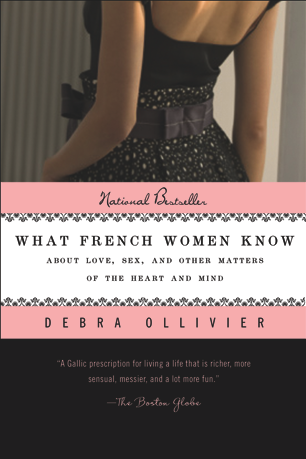 I have a confession to make: when I was at my sister Kate’s for Christmas, I saw this book on her shelf and
I have a confession to make: when I was at my sister Kate’s for Christmas, I saw this book on her shelf and stole borrowed it without permission. I finished it just yesterday, and at the risk of embarrassing myself, I’m going to review it as my second book of this year.
This book presents a fascinating perspective on French lifestyle, attitudes, and culture. Even though it’s geared more for women than for men, I enjoyed it in the same way I enjoyed Twilight–as an interesting anthropological experience.
It goes beyond that, though. The picture Ollivier paints of French culture is fascinating in and of itself, if nothing else for the contrasts she points out between us (Americans) and them. According to Ollivier, the key difference is that the French have a deep understanding of “the brevity of time and the immediacy of pleasure.” Ollivier follows this philosophy out to its logical conclusions to show that everything in French culture is an outgrowth of this–and it makes sense.
For a non-fiction book, the writing itself is quite entertaining, with constant pop culture references and a playful, humorous style. It was a delight to read, and fairly easy as well.
However, I did get the feeling that it was a little too enthusiastic and non-critical to present a comprehensive or truly accurate picture of French culture. Between the lines, Ollivier seems to be saying that if we Anglos would just be a little bit more like our “French sisters,” most of our problems (like our obsession with marriage, our frustrations with perfection, and our general lack of passion) would be solved.
I take issue with this: as much as we have to learn from the French, their culture has a lot of issues as well. For example, I personally believe that Laïcité is fundamentally incompatible with a multicultural society, and leads to de facto state repression of legitimate religious expression in the public sphere (such as the wearing of the headscarf).
Also, whenever Ollivier described American culture, I always felt as if she was describing something completely alien to my own experience. There might be a good reason for this, considering how for the past six years I’ve lived in Utah Valley, a bastion of Mormon culture so unlike the rest of the American mainstream. However, it might also be that Ollivier exaggerates the worst excesses of this continent in order to more sharply contrast the subject matter of her book.
As a writer, though, I found this book inspiring–particularly as a writer of science fiction. In my novels, I’m constantly inventing new cultures to populate the many worlds in my science fictional multiverse. This book, with its clear and entertaining analysis of some very real-world cultural differences, gave me an excellent world-building prototype and a whole plethora (oh how I hate that word) bunch of new ideas for ways to enrich my stories. In fact, this book gave me just what I needed to get through the block that had kept me from writing Star Wanderers, so if nothing else, there’s that.
So yeah, if you’re interested in world cultures or world-building cultures of your own, it’s worth your time to check out this book. It’s perhaps not the most thorough or comprehensive book, but it is entertaining, and fairly insightful as well. I mean, hey, if a science fiction geek like me enjoyed it, it’s got to be doing something right.
If you want a more comprehensive view on French culture, read 60 Million Frenchmen Can’t Be Wrong. *amused*
Is it by the same author?
No, it’s by a husband-and-wife journalist team. They spend every other year in France since he’s francophone by birth and she’s anglophone. They co-wrote it both in French– Pas si fous ces français (They’e not so crazy after all, these Frenchmen) and in English–Sixty Million Frenchmen Can’t Be Wrong. The book and its views are endorsed as accurate by a lot of French people I know.
The book you read I can’t vouch for, but it sounds like an oversimplification, if a light-hearted one.
Interesting. I’ll have to check it out sometime. Books like this can be really fascinating.
I love France and all things French. Anything that helps to explain what makes the French different is worth reading. I heard about this book on a radio show called The Book Report. They played an extract from the audio book. Hearing these extracts really makes you interested in the books. You can listen to the archived shows on http://bookreportradio.com
I haven’t read this book yet, but I heard it reviewed on The Book Report, Isn’t Elaine just the best, any way, it sounds fascinating.